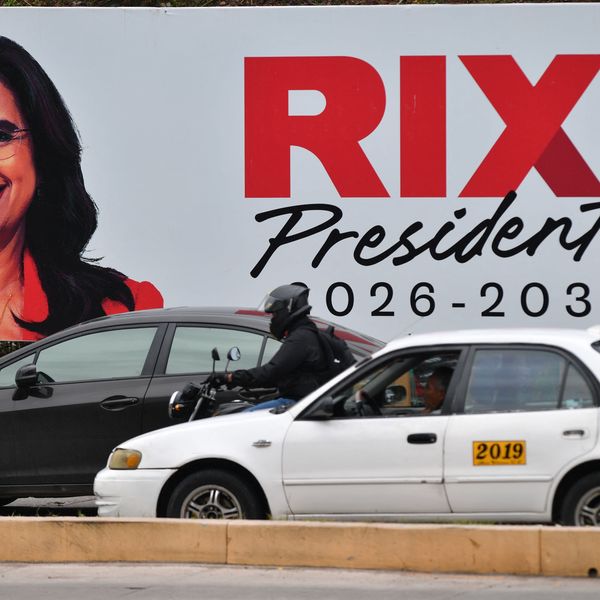Now that Manuel Zelaya has returned to Honduras,
the coup government - after first denying that he was there - has
unleashed a wave of repression to prevent people from gathering support
for their elected president.
This is how US secretary of state Hillary Clinton described the first phase of this new repression
Monday night in a press conference: "I think that the government
imposed a curfew, we just learned, to try to get people off the streets
so that there couldn't be unforeseen developments."
But the
developments that this dictatorship is trying to repress are very much
foreseen. A completely peaceful crowd of thousands surrounded the
Brazilian embassy in Tegucigalpa, where Zelaya has taken refuge, to
greet their president. The military then used the curfew as an excuse
to tear-gas, beat and arrest the crowd until there was nothing left. There are reports of scores wounded and three dead. The dictatorship has cut off electricity and water to the embassy and cut electricity to what little is left of the independent media, as well as some neighbourhoods.
This is how the dictatorship has been operating. It has a very brutal but simple strategy.
The
strategy goes like this: they control the national media, which has
been deployed to convince about 30-40% of the population that their
elected president is an agent of a foreign government who seeks to turn
the country into a socialist prison. However, that still leaves the
majority, who have managed to find access to other information.
The
strategy for dealing with them has been to try to render them powerless
- through thousands of arrests, beatings and even some selective
killings. This has been documented, reported and denounced by major
human rights organisations throughout the world: Amnesty International, the Centre for Justice and International Law, Human Rights Watch, the Inter American Commission on Human Rights and others.
One
important actor, the only major country to maintain an ambassador in
Honduras throughout the dictatorship, has maintained a deafening
silence about this repression: the US government. The Obama administration has not uttered one word about the massive human rights violations in Honduras.
This silence
by itself tells you all you need to know about what this administration
has really been trying to accomplish in the nearly three months since
the Honduran military squelched democracy. The Obama team understands
exactly how the coup government is maintaining its grip on power
through violence and repression. And Barack Obama, along with his secretary of state, has shown no intention of undermining this strategy.
In fact, Zelaya has been to Washington
six times since he was overthrown, but not once did he get a meeting
with Obama. Why is that? Most likely because Obama does not want to
send the "wrong" signal to the dictatorship, ie that the lip service
that he has paid to Zelaya's restoration should be taken seriously.
These
signals are important, because the Honduran dictatorship is digging in
its heels on the bet that they don't have to take any pressure from
Washington seriously. They have billions of dollars of assets in the
US, which could be frozen or seized. But the dictatorship, for now,
trusts that the Obama team is not going to do anything to hurt their
allies.
Luz Mejias, the head of the Organisation of American
States' Inter-American Human Rights Commission, had a different view of
the dictatorship's curfew from that of Hillary Clinton. She called it "a clear violation of human rights and legal norms" and said that those who ordered these measures should be charged under international criminal law.
What
possible excuse can the military have for breaking up this peaceful
gathering, or can Clinton have for supporting the army's violence?
There was no way that this crowd was a threat to the Brazilian embassy
- quite the contrary. If anything it was protecting the embassy. That
is one reason why the military attacked the crowd.
On 11 August, 16 members of the US Congress sent a letter to Obama
urging him to "publicly denounce the use of violence and repression of
peaceful protesters, the murder of peaceful political organisers and
all forms of censorship and intimidation directed at media outlets."
They are still waiting for an answer.
Some might recall what
happened to Bill Clinton when his administration sent mixed signals to
the dictatorship in Haiti in 1994. Clinton had called for the dictator
Raul Cedras to step down so that the democratically elected president
Jean-Bertrand Aristide could be restored. But Cedras was convinced -
partly because of contradictory statements from administration
officials like Brian Latell of the CIA - that Clinton was not serious.
Even
after Jimmy Carter, Colin Powell and then-senator Sam Nunn were sent to
Haiti to try to persuade Cedras to leave before a promised US invasion,
the dictator still did not believe it. In September 1994, Clinton sent
20,000 troops to topple the dictatorship and restore the elected
president (who ironically was overthrown again in 2004, in a
US-instigated coup).
By now, the coup government in Honduras has
even less reason than the 1994 Haitian dictatorship to believe that the
Obama team will do anything serious to remove it from power.
What
a horrible, ugly message the Obama administration is sending to the
democracies of Latin America, and to people who aspire to democracy
everywhere.


